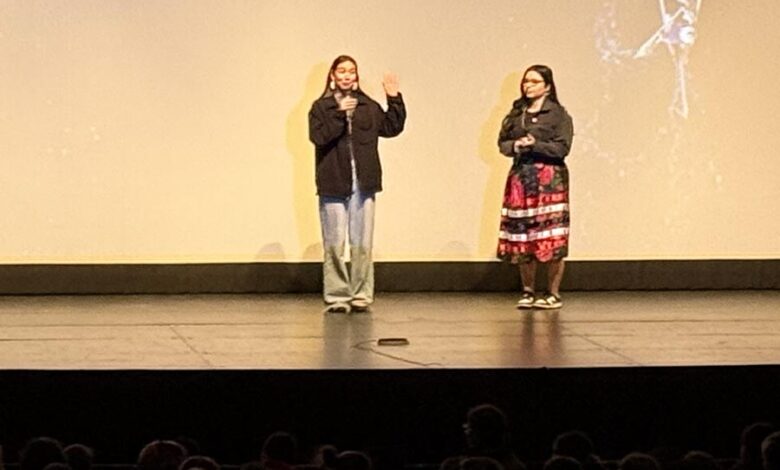Honoring the voices of women: Indigenous stories in short films

Short films meant to foster a sense of urgency and solidarity bring Indigenous women’s voices to center stage in this year’s Treaty Day Film Festival.
The seventh annual Treaty Day Film Festival, presented by Children of the Setting Sun Productions (CSSP), focuses on honoring Indigenous women’s voices. On Tuesday, Feb. 4 at 7 p.m., the historic Lincoln Theatre in Mount Vernon will screen a series of curated short films made by Indigenous women. After the screening there is a panel discussion with the women who made the shorts and Indigenous activists.
This year’s festival is meant to foster a sense of urgency and solidarity.
The event will open with songs and words from Swinomish members Kason Williams, siwəlcəʔ (Alana Quintasket), hugwalitsa (Shelly Vendiola) and yut quin (Rudy Vendiola) to welcome the community.
“We hope these films spark a deep connection to the strength and resilience of Indigenous women and their leadership in protecting our lands, waters and cultures,” wrote Adonia Cairns, the events and gathering producer for CSSP, in a recent interview.
The short films highlight urgent environmental issues, showcasing women in Indigenous communities as both storytellers and leaders. Cairns and her team curated short films that intersect traditional storytelling with modern, Native creators like director Dominique McFarlane of “Basket Lady,” a featured short at this year’s festival.
Cairns wrote that these shorts, “are not just stories; they are living truths that shape our world today. While these films speak to hard realities, they also carry hope.”
Rooted in action
“More than just films,” Cairns explained, “this festival is a call to action — to listen, to uplift, and to stand with Indigenous women as they continue to lead the way.” With the events of the film festival, Cairns emphasized that this event is not only deeply personal but also universal in their call for justice and collective action.
Although the themes and stories of this year’s short films vary, Indigenous women are at the heart of the festival. Jeff Barehand, president and CEO of Sky Bear Media, a production company headquartered in Olympia, wrote in a recent interview that he is glad to see women being supported and heard. “I hope this continues, as they retake their rightful place as leaders, not just in the film industry, but in all walks of life.”
Salmon people, environmental justice
One standout short film, “2024 Salmon People Gathering,” focuses on Indigenous communities’ collective efforts to protect salmon populations and restore damaged ecosystems. In this film, the Elwha and Klamath River tribes, along with the Nez Perce and Columbia River Basin nations, work together to remove dams and heal their watersheds.
Women, as Cairns pointed out, are at the forefront of this movement leading communities with a commitment to safety and knowledge for future generations.
The documentary is part of a larger effort to make Indigenous women’s voices and efforts more visible as they work to protect the environment and cultural heritage. Cairns continued, “It is a call to action, showing that when we come together, we can heal our waters, honor our treaty rights, and ensure a thriving future for the salmon and the people who depend on them.”
Storytelling through film
The “Basket Lady,” directed by Squaxin Island filmmaker Dominique McFarlane, engages younger audiences through the juxtaposition of the Coast Salish mythological figure called the Basket Lady and the modern storytelling of film.
McFarlane was selected out of a group of young and ambitious film creators for the sixth annual Tribal Youth Film Project, with nonprofit Olympia Film Collective. The selected directors work closely alongside mentors to write and direct a film. In this case McFarlane worked closely with Barehand to write and produce her short.
“ ‘The Basket Lady’ came about because in 2023, Dominique McFarlane, a Squaxin Island youth approached me, and was fascinated by the tale, hearing it, while growing up on the reservation,” wrote Barehand.
The legendary figure is known in Northwest Coast lore for capturing misbehaving children in her large basket and taking them to her lair to eat. “Dominique remembers the Basket Lady as a real threat, something that would cause her to peer out into the woods at night, with wonder,” said Barehand. As a fan of the horror genre McFarlane developed a script for modern viewers to experience a piece of her younger self’s imagination.
“It is a story full of humor, a cautionary tale woven throughout Coast Salish cultures, and so well-executed by a young and talented female Indigenous filmmaker,” Cairns said.
When casting the production, Barehand said the choice was easy. “I knew there was only one person who we should cast for this: Quinault storyteller Harvest Moon.” Barehand had seen Harvest Moon storytell before and even remembered her doing a Basket Lady impression.
This short film uniquely intersects modern film making and traditional storytelling for a cultural event rarely seen on large platforms. The short maintains Indigenous mythology as a meaningful cultural influence. “It reminds us that Indigenous storytelling is alive and evolving, with messages that remain deeply relevant today,” wrote Cairns.
Change through storytelling
“Women are a driving force in the world,” wrote Barehand, a sentiment that resonates powerfully through the films showcased at this year’s Treaty Day Film Festival. The seventh annual event offers a platform for Indigenous women leaders, highlighting their vital roles in protecting the cultures and environments that sustain them and the region.
Looking ahead, Cairns reflected on the film’s messages. “They carry a message for future generations — that you are never too young or too old to make a difference. By listening, learning, and standing together, we amplify voices, inspire hope, and create meaningful change that will echo long into the future.”
— By Mickey Mann
• • •
Did you find this story useful? If so, share it with a friend, a family member or colleague
and ask them to subscribe to Salish Current (it’s free) for more stories like this.
We welcome letters to the editor responding to or amplifying subjects addressed in the Salish Current.
Got an idea for a Community Voices essay? Email your subject proposal to Executive Editor
Mike Sato (msato@rockisland.com) and he will respond with guidelines.
Help keep the local news flowing — support nonpartisan, fact-based, no-paywall local journalism
with a donation to the Salish Current — news for people, not for profit.
Source link

